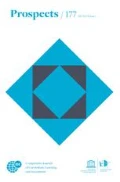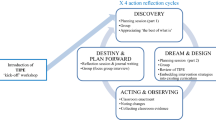Abstract
This article has three purposes. First, it presents findings from a study of student retention and dropout in Cambodia, as pupils transition from primary to lower secondary school. Second, it aims to understand from an in-depth, emic perspective the dynamics of this process and the challenges that individual families and their students face around this transition. Third, it offers policy-relevant suggestions for addressing obstacles to students continuing in school. It meets these goals by combining complexity theory with the use of narrative research methods in interviews with student-parent pairs in urban, rural, and remote communities in Cambodia.
Similar content being viewed by others
References
Ang, S., & Conochie, G. (2014). Rights to education in Cambodia. Phnom Penh: National Education Partnership.
Benveniste, L., Marshall, J., & Araujo, M. (2008). Teaching in Cambodia. Phnom Penh: World Bank.
Bray, M., & Bunly, S. (2005). Balancing the books: Household financing of basic education in Cambodia. Hong Kong: University of Hong Kong.
Brehm, W., & Edwards Jr., D. B. (2014). The many spaces of learning: Private tutoring and post-2015 Education for All. Norrag News, 50, 56–58. http://www.norrag.org/en/publications/norrag-news/full-list-of-norrag-news.html.
Brehm, W. C., Silova, I., & Tuot, M. (2012). The public-private education system in Cambodia: The impact and implications of complementary tutoring. London: Open Society Institute.
Geeves, R., & Bredenberg, K. (2005). Contract teachers in Cambodia. Paris: UNESCO International Institute for Educational Planning.
Hunt, F. (2008). Dropping out of school: A cross-country review of literature. CREATE research monograph no. 16. Brighton, UK: University of Sussex. http://www.create-rpc.org/pdf_documents/PTA16.pdf.
Kitamura, Y., Edwards Jr., D. B., Williams, H. J., & Chhinh, S. (Eds.) (2015). The political economy of schooling in Cambodia: Issues of equity and quality. New York: Palgrave MacMillan (forthcoming).
Lieblich, A., Tuval-Mashiach, R., & Zilber, T. (1998). Narrative research: Reading, analysis and interpretation. Thousand Oaks, CA: Sage Publications.
Maaz, K., Hausen, C., McElvany, N. & Baumert, J. (2006). Stichwort: Übergänge im Bildungssystem. Theoretische Konzepte und ihre Anwendung in der empirischen Forschung beim Übergang in die Sekundarstufe. [Transitions in the education system. Theoretical concepts and their application in empirical research at the transition to lower secondary school]. Zeitschrift für Erziehungswissenschaft, 9(3), 299–327.
Mason, M. (2009). Making educational development and change sustainable: Insights from complexity theory. International Journal of Educational Development, 29, 117–124.
Moen, T. (2006). Reflections on the narrative research approach. International Journal of Qualitative Methodology, 5(4), Article 5. http://www.ualberta.ca/~iiqm/backissues/5_4/pdf/moen.pdf.
MoEYS [Ministry of Education, Youth and Sport] (2008/2009). Education statistics and indicators. Phnom Penh: EMIS Office, Department of Planning.
Morton, E. (2014). Government spending, foreign aid up in 2013. The Phnom Penh Post, May 22. http://www.phnompenhpost.com/business/government-spending-foreign-aid-2013.
NIS [National Institute of Statistics] (2009). Education 2007. Report based on the Cambodia Socio-Economic Survey. Phnom Penh: NIS.
No, F., Sam, C., & Hirakawa, Y. (2012). Revisiting primary school dropout in rural Cambodia. Asia Pacific Education Review, 13(4), 573–581.
Nordtveit, B. (2010). Development as a complex process of change: Conception and analysis of programs and policies. International Journal of Educational Development, 30, 110–117.
O’Shea, P. (2007). A systems view of learning in education. International Journal of Educational Development, 27, 637–646.
Pellini, A. (2005). Decentralisation of education in Cambodia: Searching for spaces of participation between traditions and modernity. Compare, 35(2), 205–216.
Springer, S. (2011). Articulated neoliberalism: The specificity of patronage, kleptocracy, and violence in Cambodia’s neoliberalization. Environment and planning A, 43, 2554–2570.
UNESCO (2012). Opportunities lost: The impact of grade repetition and early school leaving. Paris: UNESCO.
Velasco, E. (2004). Ensuring gender equity in education for all: Is Cambodia on the track? Prospects, 34(1), 37–51.
Wertsch, J. V. (1991). Voices of the mind: A sociocultural approach to mediated action. Cambridge, MA: Harvard University Press.
Author information
Authors and Affiliations
Corresponding author
About this article
Cite this article
Edwards, D.B., Zimmermann, T., Sitha, C. et al. Student transition from primary to lower secondary school in Cambodia: Narrative insights into complex systems. Prospects 44, 367–380 (2014). https://doi.org/10.1007/s11125-014-9318-x
Published:
Issue Date:
DOI: https://doi.org/10.1007/s11125-014-9318-x




